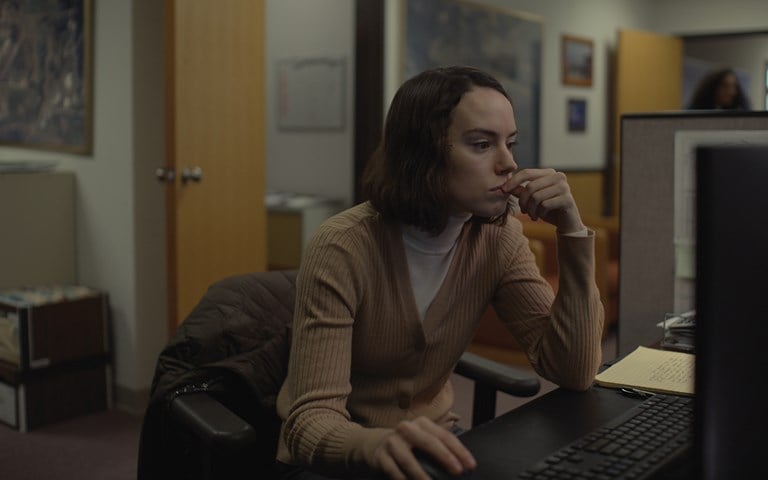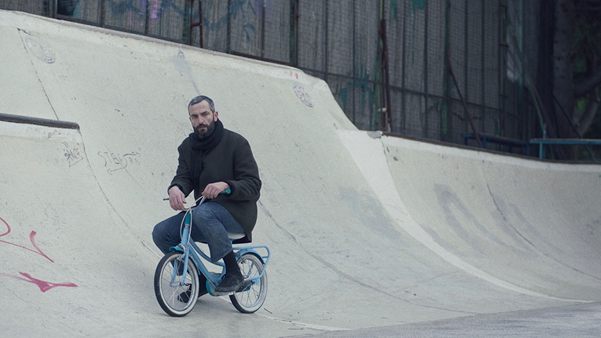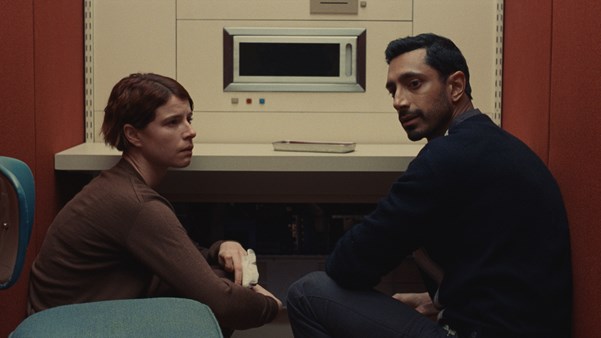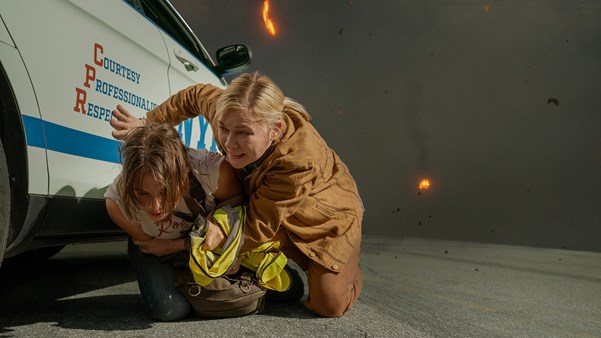Savina Petkova puts her university training to good use with a helpful guide to this school of 20th-century philosophical thought that’ll help you distinguish Camus from Kierkegaard.

For most of my adult life, I was convinced that my philosophy degree was useless. Acute awareness of epistemological conundrums and syllogisms never came in handy, except that one time I could be smug about deciphering a reference to Anselm’s ontological argument for God’s existence in Killing Eve (2018-2022). But what’s great about films is that, by virtue of narrative and form, they can teach us philosophy arguably better than any dusty old book. Rachel Lambert’s melancholy-tinged romantic comedy Sometimes I Think About Dying – which finds Daisy Ridley’s taciturn, socially awkward office worker Fran gradually opening up to her new colleague Robert (Dave Merheje) – does exactly that by offering a visually stylish crash-course in existentialist thought.

Lesson 1
There is Only One Really Serious Philosophical Question, and That is Suicide
This quote belongs to French-Algerian writer Albert Camus, whose prose – from The Stranger (1942) to The Plague (1947) – confronted the general absurdity of life following World War II. As humanity was trying to grapple with the literal and metaphorical ruins left by the Holocaust, Camus, like other existentialist thinkers, interrogated life in the context of death and mortality.
One would expect a film titled Sometimes I Think About Dying to depict such ideas. More so, it abounds with stylised, beautifully composed imagery of Fran lying unconscious, with eyes wide open, on the ground in various (solitary) settings. A forest or an empty office provide enough solace as an imaginary resting place for the character without any funeral pageantry: her visions of death are vivid and rather unconventional. But does she really dream of suicide? Actually, imagining death scenes as symmetrical tableaux – arms spread, no blood or injuries in sight – is more of an exercise that enables Fran to reconnect to life’s monotonous rhythms.
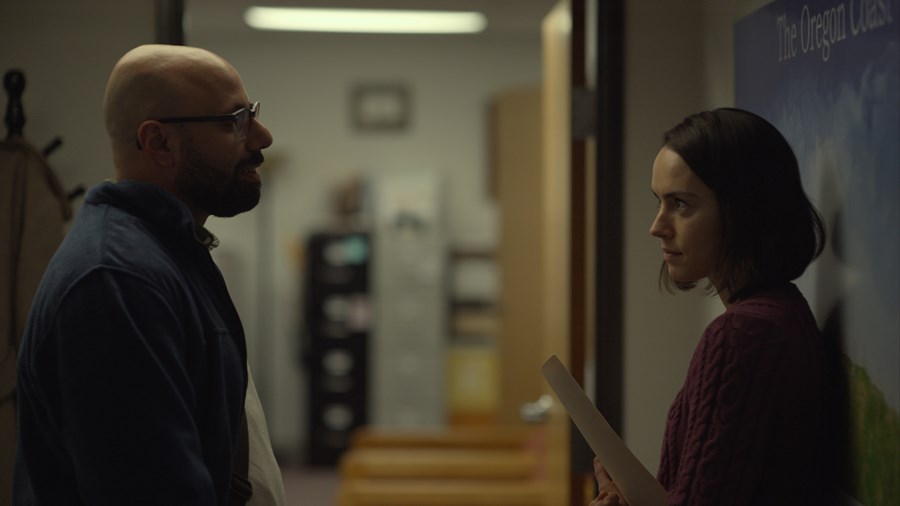
Lesson 2
Existence Precedes Essence
When Fran’s new colleague Robert asks her about her likes and dislikes, she candidly answers: ‘I like my job because I’m good at it.’ As a late-twenties/early-thirties woman who lives alone, walks to work every day to sit at a desk and be in charge of spreadsheets at a nameless small company, the film’s protagonist should probably be wanting more out of life. But she doesn’t. Quite the opposite: her contentment has little to do with the fear of change. Contrary to societal expectations, Fran seems able to self-actualise in a stale job environment.
Camus’ contemporary Jean-Paul Sartre saw the self as a constant process of making and remaking. In other words, life unfolds in a non-linear way and there is no predetermined nature (or essence) to what that life should be. Even though Dustin Lane’s static camera almost always frames Fran fixed in a semi-cubicle, while her co-workers roam around freely. The serenity of those rather long takes allows us to also experience the workplace as a zone of safety and comfort. As such, the office welcomes Fran’s imaginary death scenarios rather pushing her towards simple escapism.
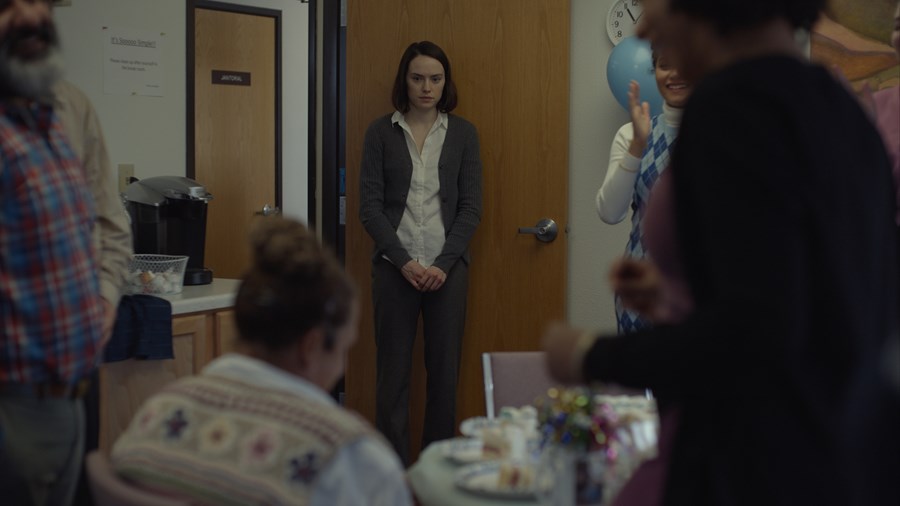
Lesson 3
The Philosopher’s Angst Is Just Spicy Anxiety
For better or worse, we exist in (and through) our bodies. Truths of the flesh cannot be explained away so easily, they have to be embraced. Being is more about doing than knowing, wrote Danish philosopher Soren Kierkegaard, and Fran knows it well. Unlike Stefanie Abel Horowitz’s eponymous 2019 short film (also adapted from the 2013 play Killers), Lambert’s Sometimes I Think About Dying denounces voiceover and instead confronts us with Fran’s physical manifestations of anxiety. Decisions are made hesitantly, words get jumbled, she avoids social situations at any cost. Whether accepting Robert’s invitation to go to the cinema together, showing up at someone’s game night, or typing a good morning message in Slack, Fran is visibly nervous. Similarly, we as individuals often find ourselves the source of our own anxiety when faced with choices and options. Especially when another person is concerned.
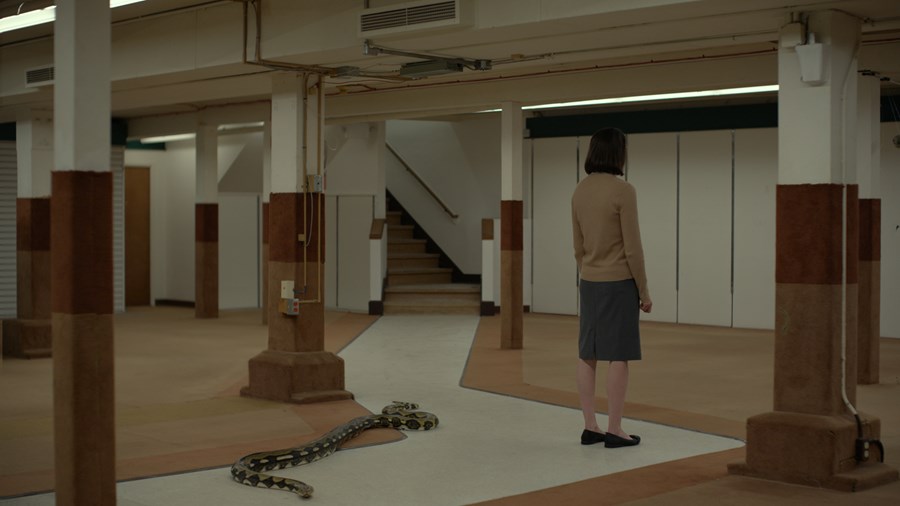
Lesson 4
Hell Is Other People
Existentialism is rooted in one’s first-person experience. The ‘I’ already invites us to examine the ways we engage with the world, as well as the struggle to not only make sense of life, but also to make the most out of it. For Fran, a solitary mode of living means she can observe the world as if it was a scientific experiment she does not partake in. The camera often aligns with her perspective, peeking through a half-open door or looking over Robert’s shoulder while he is at his desk. Fran is a spectator to all office interactions. Notably, the film’s soundscape always presents us with other people’s conversations on high volume, however far away they may be from the camera’s viewpoint.
Distance becomes proximity in a frightening instant, and Fran realises that perception goes both ways. When Sartre proclaimed that ‘Hell is other people’, he was alluding to the vulnerability of being seen by others, a position that can easily compromise one’s sense of authenticity. But Fran is not decisively antisocial. Even if she prefers to be imperceptible, she remains curious in her interactions with Robert. Rather than presenting her as a container of inner thoughts unrelated to the world around her, Sometimes I Think About Dying finds subtle ways to show how enmeshed human existences are, whether we like it or not.
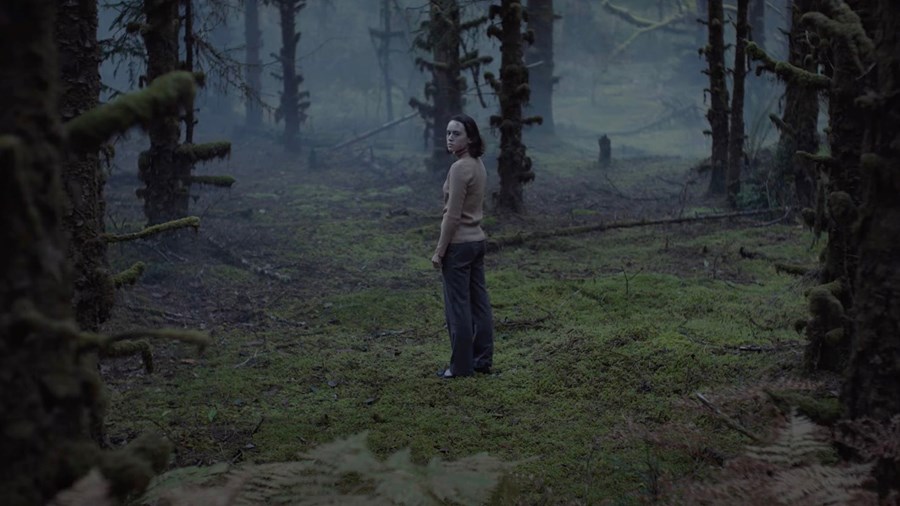
Lesson 5
It’s Hard Being a Person
Death is inevitable, and so is life. Lambert adorns Fran’s grim daydreaming with sultry images where nature flourishes, leaves and branches sprawling across naked floors and walls. Narratively, these scenes rupture the story of an isolated woman breaking out of her shell to meet a man who – somehow! – dares to get to know her. Visually, they remind us that beginnings often sprout from the most unlikely places.
As the film opens, one of Fran’s co-workers is about to retire. She is sent off with a card and a cake; the next day, her desk is empty. Later on, Fran learns that Robert has been divorced twice, i.e. he has survived the end of two relationships, and this discovery throws her off. Could it be that the sense of an ending has been discreetly lurking in the background all along? If so, those pre-emptive visualisations of death become a soothing ritual, a jolt back into life. Sometimes I Think About Dying’s Fran strikes us as a lonely woman stuck in a perpetual present tense, with neither past nor future to bookend it, so her thoughts of dying – would the existentialists please stand up? – define her living. It’s a truism that only a finite thing can be meaningful. Just as infinity is meaningless, finitude and mortality is what gives human life value. So take it from Fran, a closeted millennial existentialist: it’s OK to sometimes think about dying because being a person is already hard enough.
WATCH SOMETIMES I THINK ABOUT DYING IN CINEMAS
